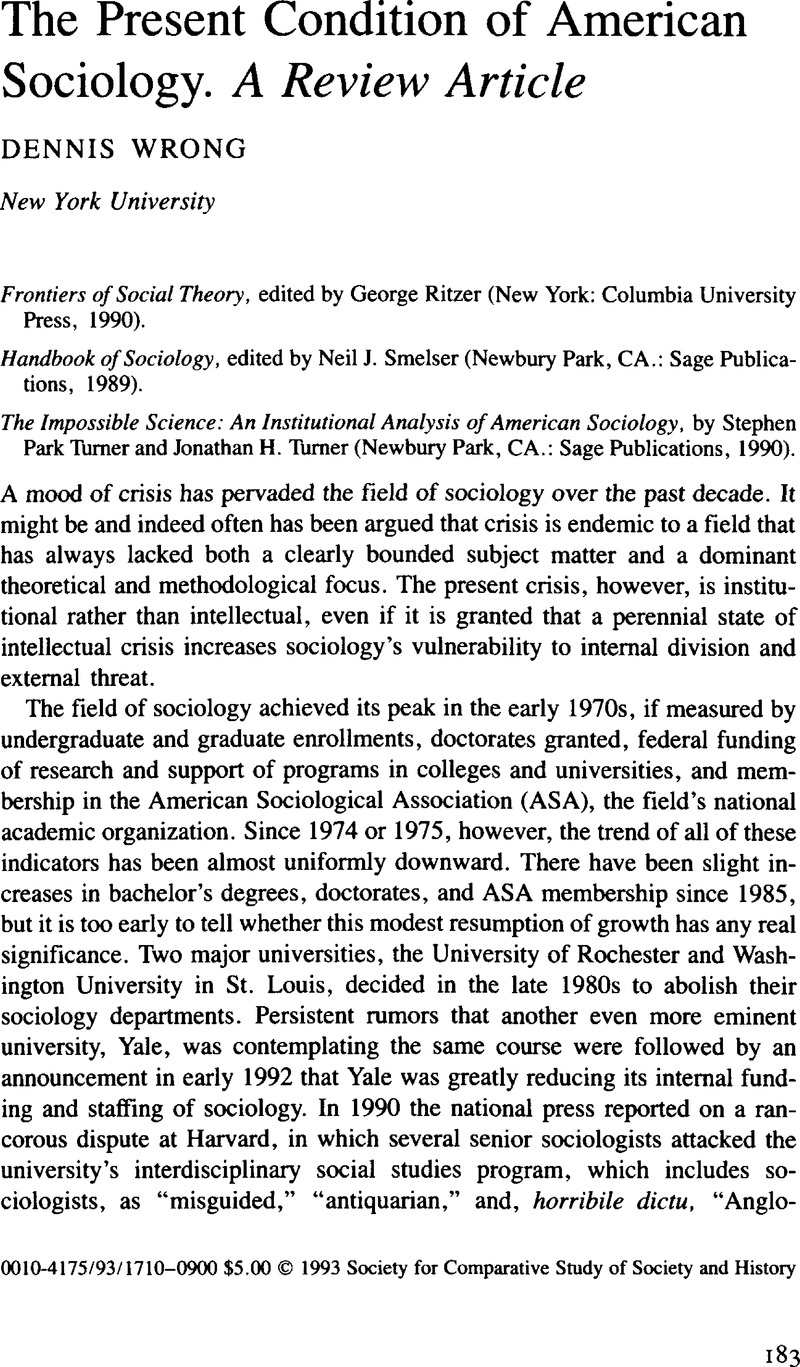Published online by Cambridge University Press: 03 June 2009

1 “Bitter Debate Ignites over Social Sciences,” The New York Times, 04 16, 1990, p. B4Google Scholar.
2 “Sociology's Long Decade in the Wilderness,” The New York Times, Section E, “The Week in Review,” 05 28, 1989, p. 6Google Scholar.
3 Letters, “Sociology is a Young Science, Still Carving Its Place,” The New York Times, 06 27, 1989, p. A22Google Scholar.
4 Quoted by Moore, Barrington in Moore, Political Power and Social Theory (Cambridge, MA.: Harvard University Press, 1958), 127Google Scholar.
5 Wiley, Norbert, “The History and Politics of Recent Sociological Theory,” in Ritzer, George, ed., Frontiers of Social Theory (New York: Columbia University Press), 392–415Google Scholar.
6 Turner, Jonathan, “The Past, Present, and Future of Theory in American Sociology,” in Ritzer, , ed., Frontiers of Social Theory, 371–91Google Scholar.
7 Collins, Randall, “Cumulation and Anti-Cumulation in Sociology,” American Sociological Review, 55 (06 1990), 462–3CrossRefGoogle Scholar.
8 New York: Oxford University Press, 1959, 59–64Google Scholar.
9 Cambridge: Cambridge University Press, 1984Google Scholar.
10 Collins, Randall, “The Mega-Historians,” Sociological Theory, 8 (Spring 1985), 114–22CrossRefGoogle Scholar.
11 Parkin, Frank, Marxism and Class Theory: A Bourgeois Critique (New York: Columbia University Press, 1979), 25Google Scholar.
12 Wiley, Norbert, “The Current Interregnum in American Sociology,” Social Research, 52 (Spring 1985), 179–207Google Scholar.
13 Wrong, Dennis H., “The End of the ‘Waiting for Newton’ Syndrome,” Contemporary Sociology, 7 (11 1978), 734–7CrossRefGoogle Scholar.
14 Jacoby, Russell, The Last Intellectuals: American Culture in the Age of Academe (New York: Basic Books, 1987)Google Scholar. Jacoby uses the term “public intellectuals” to describe the breed whose disappearance he deplores and the phrase has achieved wide currency. It is, I believe, a misnomer, for most of Jacoby's exemplars saw themselves as writing for each other, rather than for a general public, just as much as the academic specialists who have in Jacoby's view supplanted them. That they wrote better and may have thought more clearly is another matter.
15 Bell, Daniel, The Winding Passage (Cambridge, MA: ABT Books, 1980), 325Google Scholar.
16 “Sociology's Long Decade in the Wilderness,” The New York Times, p. E6Google Scholar; “Sociology is Branching Out, But Will the Field Be Splintered?,” The New York Times 08 30, 1988, p. A14.Google Scholar
17 Wrong, Dennis H., “The Influence of Sociological Ideas on American Culture,” in Gans, Herbert J., editor, Sociology in America, (Newbury, CA.: Sage Publications, 1990), 19–30Google Scholar.
18 Cockerham, William C., “Medical Sociology,” in Smelser, , ed.,Handbook of Sociology, 575Google Scholar. Cockerham reports that more sociologists work in medical sociology than in any other subfield in both Western Europe and the United States.
19 So I am assured by my New York University colleague, David Greenberg.
20 Turner, , “The Past, Present, and Future of Theory in American Sociology,” 388Google Scholar.
21 Smelser, , “Introduction,” in Smelser, , ed., Handbook of Sociology, 10Google Scholar.